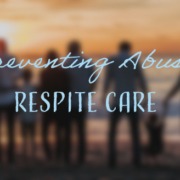Preventing Abuse: Respite Care
Parenting is hard! One of the most challenging jobs in the world, it requires patience, empathy, and the ability to think on your feet. Parents are responsible for their children’s physical, emotional, and mental well-being. It can be overwhelming at times.
Additionally, parents may have other stressors to handle, like balancing work and life, changing jobs, the death of a loved one, and unemployment. Depression, anxiety, and drug and alcohol abuse can amplify these situations. Research shows that parental stress and child abuse are correlated. “Parenting stress has been linked to aspects of problematic parenting such as harsh parenting, severe physical disciplinary practices, low parental warmth, and negative and controlling behavior.” Alleviating stress can reduce the potential for abuse.
One way to help parents reduce stress is respite care. Respite care is temporary childcare to give the parent a break from their routine. It provides a parent with time to rejuvenate. Respite care is only helpful if it is used. We need to normalize the idea that asking for help is a sign of strength, not weakness. Encourage parents to assess their stress levels and seek help when needed.
Friends and family are an excellent resource for respite care. They are usually the first ones to see parental stress. Because of their relationship, parents may find it easiest to accept help from them. Helping families in this way is a beautiful way of showing God’s love and provides a way to serve those who are hurting.
Crisis nurseries, available in some communities, are another alternative for parents. A crisis nursery is a nonprofit that offers care for children, usually ages 0 – 12, for up to 72 hours. This service is often free to the family and can be accessed multiple times yearly. Crisis nurseries offer advocates to help a family in crisis identify community solutions.
The church can help parents learn to navigate stressful times. Look for opportunities to create stronger bonds between newer parents and well-seasoned ones. This can be anything from a formal mentorship program for new parents to a Bible class for parents. Foster a culture of caring where members check in with parents to make see if they are okay and offer encouragement to use resources if they are not.
Taking care of parents is crucial in the journey to preventing abuse. How will you encourage someone today?
- Preventing Abuse: An Overview
- Preventing Abuse: Respite Care




